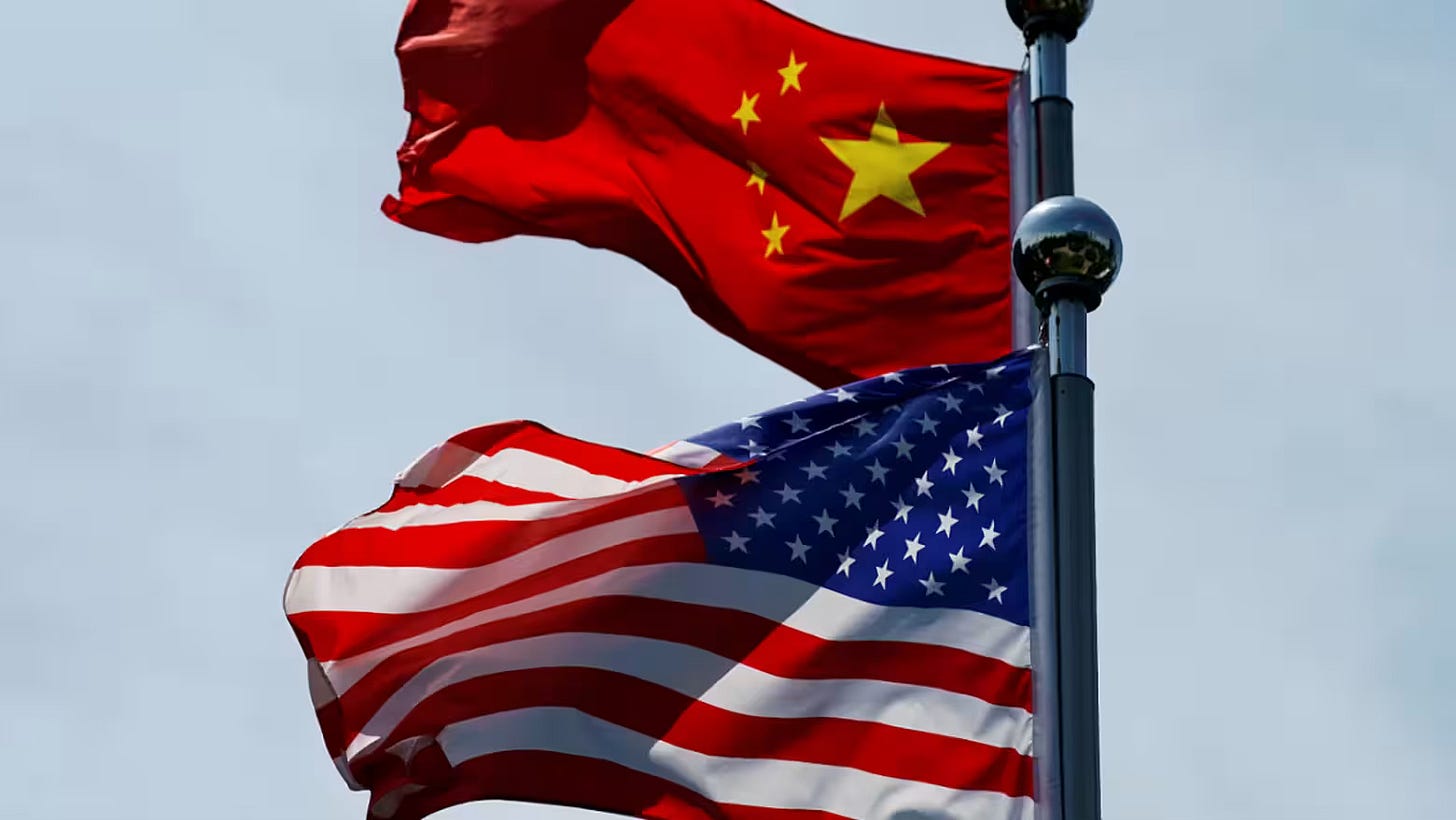[POST] America's Retreat from the World, 2009-2029
A pivotal chapter in the history of the world, but hardly its end
This is a reader-supported publication. I give it all away for free but could really use your support if you want me to keep doing this.
The period 2009-2029 will go down in history books as The Great American Retreat from Global Leadership.
Understand, I come to praise globalization, not bury it.
America appeared to reach this conclusion around the time of the 2006 midterm elections, which were widely viewed as a firm rebuffing of George W. Bush’s Global War on Terror (GWOT) and the overseas military interventions it spawned: it was time for this nation to stop being so fundamentally in charge of global security — a role we had played since 1945.
The dominant issue in the 2006 midterms was the war in Iraq. Those who disapproved of the war or wanted to “bring the boys home” overwhelmingly supported Democratic candidates, rendering this a wholly nationalized election — a political dynamic we have lived with since.
Many Americans felt they had been misled into an unnecessary and costly war, and there was growing skepticism about the rationale for continued military engagement abroad. The general vibe I recall was one of, Well, if this is what it takes to defeat terrorism worldwide, then it’s just not worth it.
The election’s outcome reflected a desire for a new direction in US foreign affairs — less confrontational and more cooperative, and in 2008 Obama fit that bill nicely. He promised to bridge differences between the West and Islam and concentrate far more on “nation-building” at home — an increasingly popular idea as many Americans realized how difficult it was to accomplish this abroad.
To cover his national security flank, Obama proposed a “pivot” to Asia, resurrecting America’s growing fears of China’s rise — fears that had been back-burnered as a result of 9/11 (something I have always portrayed as a good thing for the world).
However, all these immediate rationales (too costly, need to rebuild America, more urgent to fear China) masked a larger American vibe: the concept of strategic retreat from the world, or a deliberate reduction of US global engagement, military presence, and leadership in international institutions. This trend has spanned the presidencies of Obama (2009-2017), Donald Trump (2017-2021), Joe Biden (2021-2025) and Trump 2.0 (2025-2029), with each administration contributing to this trend in distinct but complimentary ways — despite all the critical cross-talk.
By 2011, Obama had initiated significant troop withdrawals from Iraq and a general reduction in military commitments in the Middle East. His "leading from behind" approach emphasized relying on local partners and limited direct military intervention — a model he pursued in both Libya (where European NATO stepped up in more pronounced ways) and Syria (where the Russians and Iranians eventually came to dominate in our absence).
America’s growing confidence in its booming fracking revolution (oil and gas) found reflection in the Obama Administration’s back-burnering of the Middle East in general — as in, we don’t need their energy, so why keep getting stuck with the bill for protecting it? (a habit we have a hard time breaking even today — see our costly naval response to Yemen Houthis threatening sea traffic there). The ultimate expression of that desire for disengagement was the Iran nuclear deal, the goal being to freeze that development and let Israel and the Saudis step up as providers of local deterrence to Iran’s growing reliance on regional proxies to exert its influence.
In all, Obama’s eight years represented a re-prioritization of US strategic interests: expect Europe to do more for itself, discount Russian aggression against its old imperial holdings (then, Georgia), get out of the Middle East, keep our footprint light in Africa, ignore Latin America (as usual), and focus on China’s rise — the “ball” we “took our eyes off” by recklessly obsessing over the GWOT!
Once in office, Trump accelerated the retreat by questioning the value of longstanding alliances and multilateral organizations. He withdrew from the Paris Climate Accord, the Iran nuclear deal, and the UN Human Rights Council, among others. The Trump administration prioritized unilateral action (to include a general FU to the ICC), reduced troop levels in conflict zones, and signaled a desire for allies to shoulder more responsibility for their own security.
In many ways, then, Trump just hardened all the softer moves previously initiated by Obama — saying the quiet part out loud, as it were. His push for the Abraham Accords — a genuine diplomatic breakthrough — was also clearly part of a strategy to reduce direct US entanglement in the Middle East. Israel was given a green light to do whatever it felt necessary to secure itself, as were — in effect — the Saudis (Who wants some nuclear weapons! You do! Yes, you do!).
Trump Inc. signaled its great desire to participate in, and profit from, the PG monarchies’ emerging grand strategy of transforming the region — globalizing it, as it were — and tactically deploying its vast petrodollar wealth across neighboring regions, to include Africa. That’s how Jared Kushner won a $2B investment from the Saudi sovereign wealth fund right after leaving the White House with his father-in-law in 2021.
And yes, there is something decidedly sleazy about all that, even as there is something great about all that. I mean, don’t you prefer that sort of political sleaze and economic ambition versus getting bogged down in some “endless war”? Meh! I say, you get what you pay for.
Biden continued the trend by overseeing the complete withdrawal from Afghanistan and further reducing troop levels in Iraq. His National Security Strategy deprioritized the Middle East, focusing instead on competition with China and Russia (sigh!), and on global challenges like climate change (yay!).
In his second term, Trump has taken the retreat further, signing executive orders to review and potentially withdraw from hundreds of international organizations and thousands of treaties — no kidding! Trump’s administration has made clear its intention to revolutionize US foreign policy, rejecting multilateralism and dismantling the institutional framework of post-1945 American internationalism.
We can all be shocked by these latest developments, but they were a long time building, which is why the shock value of these moves — outside of the US foreign policy establishment — has been met with such muted indifference by the American public.
As I have long argued here: It is only natural that, in our success in fostering the peaceful rise of a multipolar world anchored by a truly globalized world economy (and it is stunningly peaceful on the whole), America would come to realize it no longer needed to run the world so decisively — in part because of cost and our demographic aging and in part because it’s just no longer possible, with the bulk of global economic activity occurring beyond our controlling reach and with risen powers increasingly asserting their security needs in regional spheres of influence (in effect, filling in the vacuum of America’s strategic retreat).
Yes, we can bemoan all these developments as some “chaotic” world lacking any and all direction, but the truth is, the world has adjusted to multipolarity with genuine smoothness — our latest example being Trump’s phony tariff war proving just how impossible and illogical and unprofitable a true decoupling of the US and Chinese economies would be.
It’s also true that American public has been calling for this outcome with some genuine determination since 2006 and that we’re now in our fifth consecutive presidency pursuing this outcome on a grand strategic basis — a serious pattern, yes?
As always, we face a world of our creating. We wanted this rebalancing of America’s market-maker and market-player roles and this is what it looks like: regional hegemons (Russia, Israel, KSA, China) doing what they feel they must and America learning to live with that shared strategic reality — even to the point of semi-resurrecting a Monroe Doctrine-like sense of possessiveness across the entirety of the Western Hemisphere.
The age of East-West integration is done. We collectively took that dynamic as far as it could logically go in terms of value chains, and now we just as logically back away from Peak Globalization to something both more rational and reactive to the growing tectonic pressures for North-South integration stemming from demographic transitions, climate change, and the rise of the Global South.
Yes, we can — and many Americas will — choose to interpret these developments as the destruction of the post-WWII international order, but that judgment is both hyperbolic and hypocritical. This is merely globalization’s next evolution, with the North FINALLY getting around to integrating the South and creating that long-sought New International Economic Order.
America can be part of that grand scheme or we can sit on the sidelines and leave it to China and India and Europe and Russia.
But it’s going to unfold no matter our level of indifference, and, while that reality may scare a lot of Americans, it should actually comfort them, because the world we built is far more resilient and locked-in than we ever could have imagined.
America birthed this world order eight decades ago. It has now grown beyond our capacity to shape it decisively all by ourselves. That happens to all parents and their offspring. It is natural and scary and good and inevitable.
So, radical acceptance it is.






